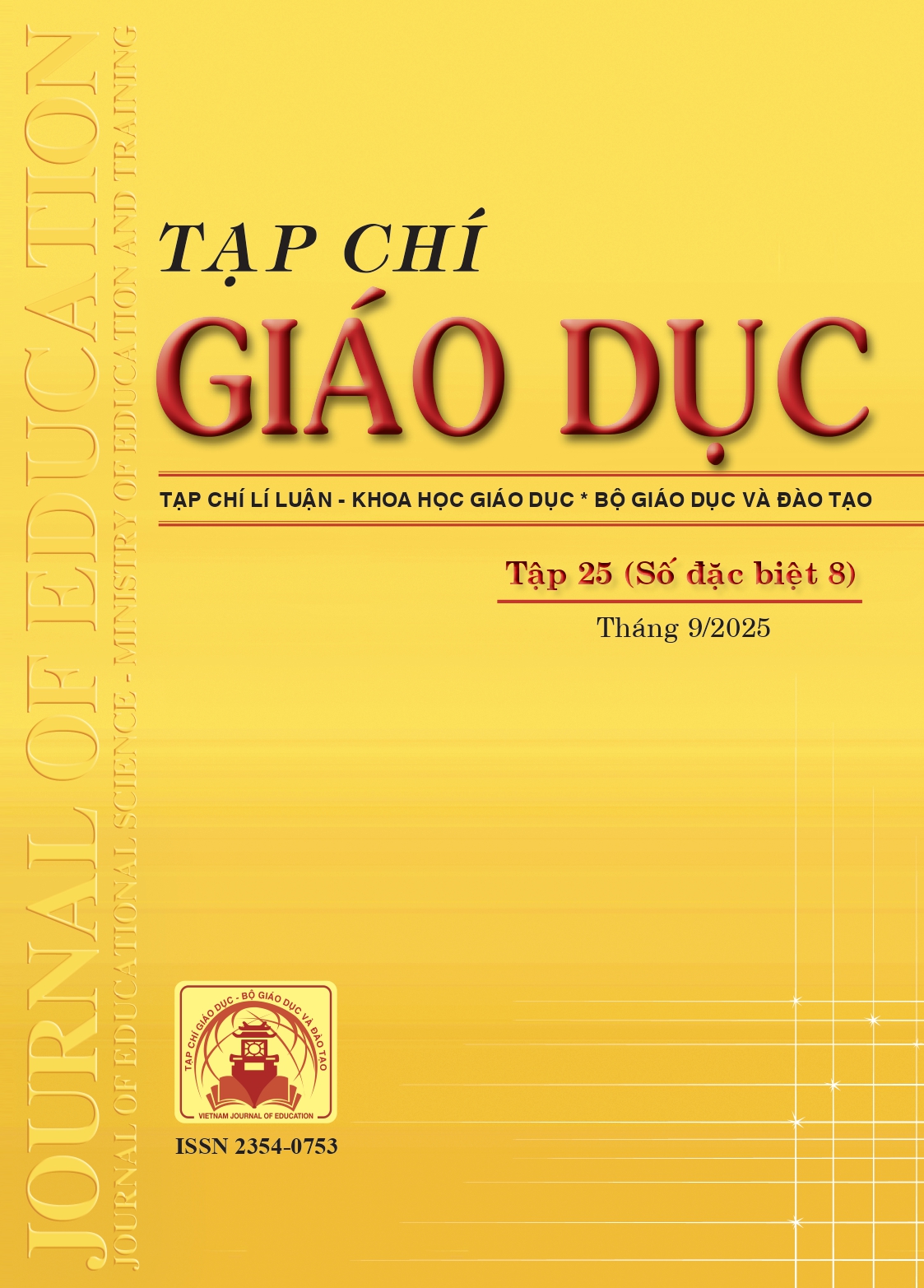Ứng dụng công nghệ 4.0 xây dựng mô hình “văn hóa số - trường học mở” thúc đẩy giáo dục sáng tạo và hội nhập trong kỉ nguyên số tại tỉnh Bắc Ninh
Tóm tắt
Artificial Intelligence (AI) is increasingly being applied across the fields of education and culture, not only bringing breakthroughs in educational methods and content, but also playing a crucial role in preserving and promoting traditional cultural values. Bac Ninh, a province rich in cultural heritage, has taken the lead in digitizing cultural assets and innovating education through AI-based solutions. This study aims to examine the applications of AI in developing the “Digital Culture - Open School” model, with three key focuses: digitizing intangible cultural heritage, building open education platforms and piloting a digital environment that connects education and culture. The research finding indicate that AI serves not merely as a technical tool but also as a driving force for educational innovation, fostering students creativity and digital integration while preserving an disseminating local cultural values. Based on these finding, the article proposes several recommendations, including the development of digital competencies for teachers and students, investment in technological infrastructure and the strengthening of cross-sectoral collaboration to ensure the sustainable and effective implementation of this model in the context of national digital transformation.
Tài liệu tham khảo
Bộ GD-ĐT (2024). Báo cáo sơ kết công tác chuyển đổi số và cải cách hành chính 6 tháng đầu năm 2024. https://moet.gov.vn/tintuc/Pages/tin-tong-hop.aspx?ItemID=9559&utm_source=chatgpt.com
Bộ Thông tin và Truyền thông (2020). Chương trình Chuyển đổi số quốc gia đến năm 2025, định hướng đến năm 2030.
Đỗ Thị Thu Hằng (2022). Xây dựng văn hóa nhà trường trong bối cảnh chuyển đổi số - vấn đề đặt ra cho cán bộ quản lí trường học. Tạp chí Giáo dục 22(3), 13-18.
European Schoolnet (2012). Future Classroom Lab Handbook. Brussels: European Schoolnet, 6-10.
FPT Education (2024). FPT Edu Report 2024: Xu hướng chuyển đổi số trong giáo dục và định hướng trải nghiệm nghề nghiệp cho học sinh phổ thông. https://drive.google.com/file/d/1h3DwBroKrlO55Euw0IoAaBIUOkEkDYRu/view?usp=sharing
Korea Education and Research Information Service (KERIS) (2016). Smart Education in Korea: ICT in Education.
Malque Publishing (2025). AI in personalized learning: Global education innovation report. https://drive.google.com/file/d/1vQTGQ4hPlLlgaiK-Oyn_7U1n520dGzR-/view?usp=sharing
Microsoft Vietnam Communications (2023). Công bố 19 trường học điển hình và hơn 1.000 Chuyên gia Giáo dục Sáng tạo Microsoft năm học 2023-2024. https://news.microsoft.com/vi-vn/2023/10/29/cong-bo-19-truong-hoc-dien-hinh-va-hon-1000-chuyen-gia-giao-duc-sang-tao-microsoft-nam-hoc-2023-2024/
Ministry of Education Malaysia (2025). Education Ministry aims to equip all schools with smartboards by 2027, says Fadhlina. Malay Mail, 3-16.
Namaziandost, E., & Rezai, A. (2024). Artificial Intelligence in Open and Distributed Learning: Does It Facilitate or Hinder Teaching and Learning? The International Review of Research in Open and Distributed Learning, 25(3), 17-19.
Nguyễn Văn Phúc (2022). Tích hợp trí tuệ nhân tạo trong đổi mới quản lí và dạy học ở trường phổ thông. NXB Giáo dục Việt Nam.
Phạm Thu Hà (2024). Vai trò của xây dựng văn hoá số trong chuyển đổi số quốc gia. Tạp chí điện tử Lí luận chính trị, 24, 20-23.
RMIT University & Ho Chi Minh City Digital Transformation Centre. (2024). The role of digital society in Vietnam’s sustainable development: policy implications for a new era. Presented at the Smart and Sustainable Cities Forum 2024, co-organized by RMIT University and HCMC-DXCENTER.
Romero, M., Heiser, L., & Lepage, A. (2023). Enseigner et apprendre à l'ère de l'intelligence artificielle: acculturation, intégration et usages créatifs de l’IA en éducation: livre blanc. HAL Open Archive, 58, 21-28.
Rusell, S. J., & Peter, N. (2021). Artificial Intelligence: Amodern Approach. Hoboken: Pearson.
Sarid, A., Fine-Davis, M., & Keiny, S. (2024). Reconceptualizing open schooling: Towards a multidimensional model of schoo openness. Journal of Curriculum Studies, 56(3), 345-365.
Sở GD-ĐT Bắc Ninh (2023). Báo cáo tổng kết năm học 2022-2023 và phương hướng, nhiệm vụ năm học 2023-2024.
Sở GD-ĐT Bắc Ninh (2024). Báo cáo số 39/BC-SGDĐT ngày 28/6/2024 về triển khai mô hình giáo dục số và AI tại Bắc Ninh.
Sở GD-ĐT Bắc Ninh (2025). Kế hoạch số 29/KH-SGDĐT ngày 28/3/2025 về đẩy mạnh ứng dụng AI trong công tác quản lí, giảng dạy và học tập giai đoạn 2025-2030.
Tỉnh ủy Bắc Ninh (2025). Kế hoạch số 166-KH/TU ngày 07/02/2025 của Ban Thường vụ Tỉnh ủy về triển khai thực hiện Nghị quyết số 57-NQ/TW của Bộ Chính trị.
UBND tỉnh Bắc Ninh (2023). Kế hoạch số 59/KH-UBND ngày 31/10/2023 triển khai Chiến lược quốc gia về AI đến năm 2030 trên địa bàn tỉnh.
UNESCO (2021). Digital citizenship education handbook: Being a citizen in the digital age.
UNESCO (2021). Reimagining our futures together: A new social contract for education. https://unevoc.unesco.org/pub/futures_of_education_report_eng.pdf
UNESCO (2023). Guidelines for the Governance of Artificial Intelligence in Education. Paris: United Nations Educational, Scientific and Cultural Organization.
UNESCO Institute for Information Technologies in Education (IITE) (2011). Open educational resources and open learning: A report.
Đã Xuất bản
Cách trích dẫn
Số
Chuyên mục
Giấy phép

Tác phẩm này được cấp phép theo Ghi nhận tác giả của Creative Commons Giấy phép quốc tế 4.0 .












